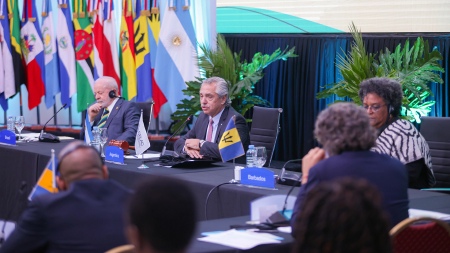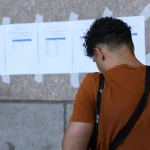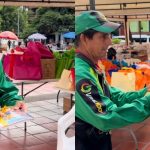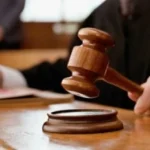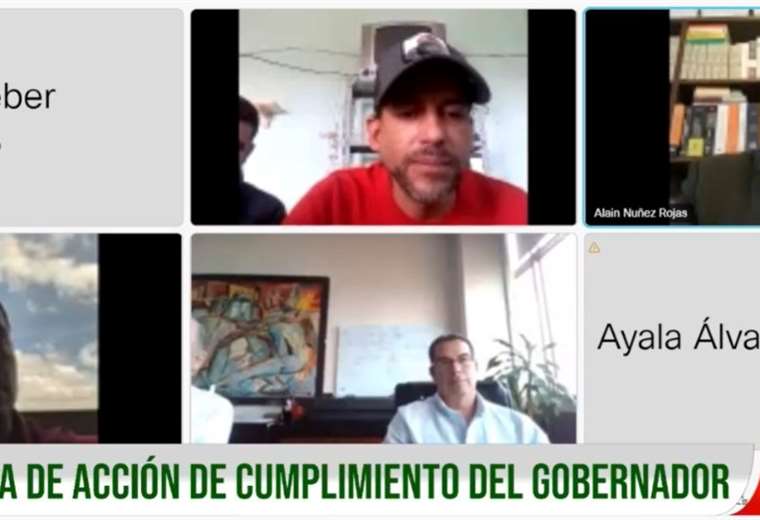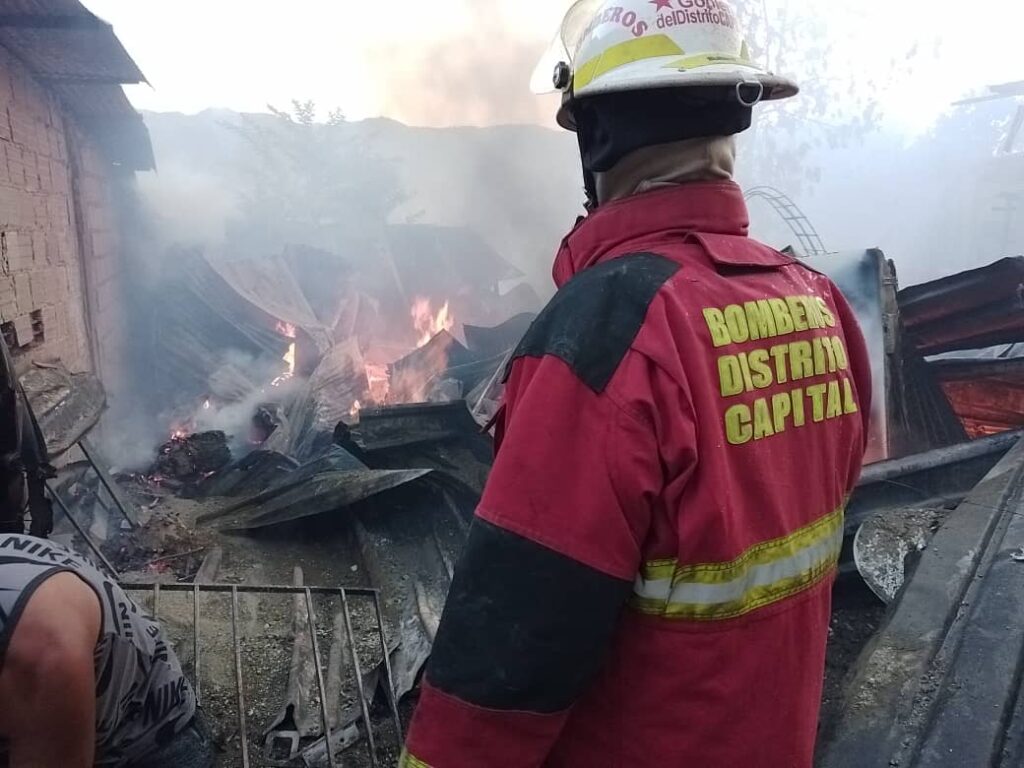A firm condemnation of the war and a constant call for peace, was the sustained position of Argentina in the face of the war between Russia and Ukraine and its NATO allies, a position that he maintained in all international forumswhile in coordination with France and other nations seeks to establish alternative diplomatic mechanisms to achieve a peaceful solutionto avoid an escalation with an uncertain future, and to get the world out of the energy and food crisis in which it was plunged since the beginning of the Russian invasion, on February 24, 2022.
Since the Russian troops began the military operation in Ukraine, the Argentine position was clear: expressed his “firmest rejection of the use of armed force”, and urged the Kremlin to “cease military actions in Ukraine” and immediately “de-escalate” the conflict “in all its edges”.
the first communication
In a statement issued on February 24, the Argentine Foreign Ministry called for overcoming the crisis based on “full adherence to all the principles enshrined in the Charter of the United Nations (UN), without ambiguity or giving precedence to some over others, with full respect for international law, the sovereignty of states and their territorial integrity, the peaceful settlement of disputes and full and profound respect for human rights”.
That was the basis of the position of the Government of Alberto Fernández, after the Kremlin’s decision to advance on Ukrainian territory, a position that was later replicated by the Argentine Head of State and his Foreign Minister Santiago Cafiero in all the international forums in which they intervened.
The global volume of the conflict forced all the States of the world to take a position, a definition that implies risks, internal debates, external restrictions and permanent interests, and that in the Argentine case had conjunctural and geopolitical risks.
On the one hand, the context of the war found Argentina in full renegotiation of the millionaire loan inherited from the Government of Cambiemos with the IMF (where the United States has decisive weight).
On the other hand, the invasion decided by Vladimir Putin made the strategic bilateral relationship between Buenos Aires and Moscow forged from the Kirchner governments, and sustained by the current government, somewhat uncomfortable.
In fact, shortly before the start of the armed conflict, Fernández made a state visit to Russia -a power that, like China, limits US power and is Argentina’s gateway to the Brics-, a gesture that had geopolitical reasons, but also thanks for being that country, the first to provide Argentines with the vaccine Sputnik in the early days of the Covid-19 pandemic.
However, throughout the war, the Fernández government sought to remain faithful to the line drawn for its foreign policy: it confirmed its position in favor of a multipolar order and the exercise of autonomy in its ties with the world.
Proof of this was, for example, Argentina’s rejection of the decision of the Western powers to impose economic sanctions on Russia.
At the first session of the United Nations the day before the Russian invasion to address the armed conflict, Argentina expressed its “concern and alarm” about the situation in Ukraine and urged “to engage in a constructive and good faith dialogue in order to find a peaceful and concerted solution”, reiterating, in substance, the position that he had expressed two days before the start of hostilities.

“The world cannot bear more suffering nor should it tolerate more deaths. Peace is urgent”, emphasized Cafiero at the Human Rights Council in Geneva, Switzerland, on February 28.
At the same time, in those days, the Argentine Foreign Ministry deployed an operation to assist compatriots who were in Ukraine at the time the war began, as well as sending humanitarian aid to the affected area.
In line with the national position, the Argentine foreign minister condemned the war and asked to recover peace in each participation he made in the UN and in its Human Rights Councilas when he spoke at the 66th General Conference of the International Atomic Energy Agency (IAEA).
On March 1, when opening the legislative sessions, Alberto Fernández referred to the Russian military operation as an “invasion” and that same day, Argentina condemned the invasion in the UN General Assembly.
On March 4, at the Human Rights Council, under the Argentine presidency, the national government supported a resolution on “the situation of human rights in Ukraine since the Russian aggression.”
On that occasion, the Argentine representative Cecilia Meirovich, director of Human Rights of the Foreign Ministry, urged Russia to cease the use of force and reaffirmed Argentina’s commitment to the principles of sovereignty and territorial integrity of States and human rights. .
Territorial integrity and human rights are two clear axes of Argentine foreign policy: the first linked to the unyielding claim in the Malvinas case; and the second closely linked to the example that the country set for the world in punishing human rights violations committed during the last civil-military dictatorship.
On May 12, Argentina voted in favor of a new Human Rights Council resolution that expressed “deep concern for the civilian victims of the conflict” and condemned the “violations and abuses of human rights and international humanitarian law” as a result of of Russian aggression, while urging the Kremlin to cease hostilities against Ukraine.
In October, Argentina voted in favor of a General Assembly Resolution that condemned Russia’s attempt to annex territ
Orios Ukrainians, and rejected the alleged referendums in the Ukrainian regions of Donetsk, Lugansk, Kherson and Zaporizhia.
A common front with France
From the pro tempore presidency (PPT) of Celac, a mechanism that he chaired during 2022, Alberto Fernández took advantage of each of his interventions in multilateral forums (General Assembly, the G7, G20, Summit of the Americas and the Paris Forum for Peace , among others) to demand peace and denounce that the southern hemisphere suffers with hunger and misery the consequences of a decided war in the north, while seeking to insert the region into secure supply chains but from the application of added value: in fact, that Latin America and the Caribbean make this global context an “opportunity” for their development.
“I have the peace of mind of having told the North that while missiles are flying, hunger is deepening in the southern hemisphere”said the head of state, during the last CELAC summit, held in January in Buenos Aires.
Earlier, in his last speech before the General Assembly, the Argentine President once again called for a “peaceful solution” to the conflict in Ukraine, deemed it “imperative that all unleashed hostilities cease”, while proposing “to work together to impose the dialogue and restore peace in the dispute that began with the military advance of the Russian Federation on the territory of Ukraine”.
Fernández together with his French counterpart, Emmanuel Macron, sought to form a diplomatic axis, with the promotion of alternative multilateral negotiation areas that allow a concerted exit to the war conflict, thus avoiding an escalation with an uncertain future, which could even include the use of nuclear weapons, and getting the world out of the energy and food crisis in which was submerged from the beginning of the confrontations in Eastern Europe.
With discretion and caution, Argentina intervened in the search for these mechanisms: In different bilateral meetings and international summits, Fernández proposed to the most important European leaders to add new actors to the discussion table on what to do to end the war, given the an evident failure that in a sense was demonstrated by different multilateral spheres in which only the powerful countries of the West were sitting against Russia.
The subject was part of the dialogues that Fernández had with Macron in recent months, with the German chancellor, Olaf Scholz, and even with Putin himself, with whom he has spoken at least twice since the war began.
Last January, Fernández also exchanged views on the war with Chancellor Scholz, on an official visit in Buenos Aires, with whom he agreed to reject the Russian invasion of Ukraine and warn of its negative consequences for the world.
On that occasion, in a joint press conference with Scholz, Fernández assured that Argentina “does not intend to send weapons” to the conflict zone, adding that “Russia must understand the damage it is causing in the southern hemisphere,” in reference to the repercussions of the war on “food prices and hunger”.
A few days earlier, his counterparts in Colombia, Mexico and Brazil had expressed the same refusal to provide weapons to kyiv.
The statements of the Latin American leaders were in response to the head of the Southern Command of the US Army, General Laura Richardson, who a few days earlier had revealed that Washington had asked six Latin American countries to donate to Ukraine their military equipment purchased from Russia.
